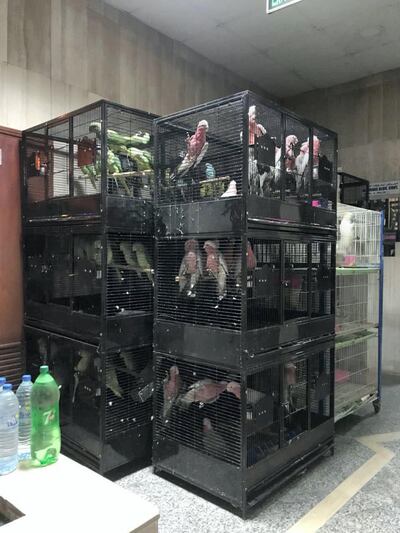Tigers, cheetahs and poisonous snakes are among the dozens of wild animals rescued from private homes by Sharjah officials this year.
Up to 142 animals have been confiscated from homes to date — a 66 per cent decrease from the 422 dangerous animals seized in the emirate last year.
Government officials said the drop is a sign that awareness campaigns about the ban on unlicensed ownership of wild animals in the UAE are taking effect.
On the second day of the National Conference on Animal Welfare in Dubai, delegates were told that strict implementation of the 2016 UAE law and better co-ordination between authorities across emirates was crucial, along with raising awareness about the health and safety risks of keeping dangerous animals in homes.
Ghaya Bisho, a researcher with the Environment and Protected Areas Authority in Sharjah, said the animals were rescued by animal welfare officials after complaints from the public or during random inspections.
The number of animals saved in the emirate hit an all-time high last year compared to the 20 rescued in 2016 and 196 in 2015. This was likely because of an amnesty announced by the UAE government that gave people who owned exotic animals until July 1 to surrender their “pets” so they could be re-homed at zoos or sanctuaries.
“We are using drama, plays and brochures to explain to people how risky it is to have wild animals and exotic birds in residences, because they could be host to viruses and bacteria that can be transmitted to humans,” said Ms Bisho.
“Our teams are accompanied by Sharjah Police when they go to confiscate these animals because, in some cases, people do not want to hand over the animals and they are given penalties because it is against the law.”
The 2016 law, that regulates the possession, trade and breeding of dangerous animals, came into force last year. It sets out penalties from Dh10,000 to Dh100,000 for owning dangerous animals. The penalty is doubled for a repeat offence.
“People usually get the animals when they are cubs and, as these animals grow bigger, they remove their teeth or declaw them. The animals are neglected when they grow old and their owners lose interest in them,” said Mohammed Nader, a conservationist and veterinarian with Al Ain Municipality.
He voiced the concerns of delegates from across the emirates, saying there should be a countrywide record of the number of wild and dangerous animals.
“Protection of animals should be taught in schools and universities as part of the curriculum. Only then will attitudes change,” said Mr Nader, who also volunteers with the International Fund for Animal Welfare.
“It becomes too expensive for some owners to look after and maintain exotic pets. Captive animals kept in enclosures can cause them stress. The message must go out that wild animals should never be kept as pets.”
Mahin Bahrami, founder of the Red Paw Foundation, called on authorities to work with volunteer groups to identify people who breed exotic animals including Persian cats.
“We need to know where and whom to complain to. Volunteers can be their eyes and ears, work with them, collaborate and give them information on these people,” she said.
Officials and volunteers at the second national conference said there was a need to fill gaps in co-ordination, monitoring and information exchange between different municipalities.
In draft recommendations, delegates suggested training for government, private sector and non-government workers and called for a network of animal welfare officials and volunteers to be created across the country.
According to the federal law, only zoos, wildlife parks, circuses, breeding and research centres are permitted to keep dangerous, wild or exotic animals. The 2016 law also revoked any permits issued to other private entities to import such animals.
Individuals who use a dangerous animal in an attack can face between three to seven years in jail if the assault leads to permanent disability of the victim, and life in prison if it leads to death.
______________
Read more:
400 illegally-trafficked birds seized from Sharjah trader
Lions and dangerous snakes among exotic animals confiscated in Sharjah
Big cats continue to be sold in UAE via social media despite federal law
______________



